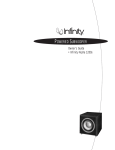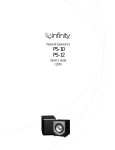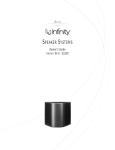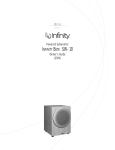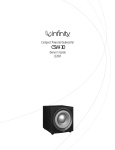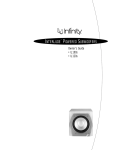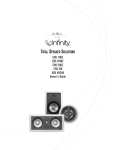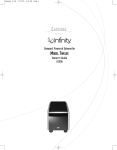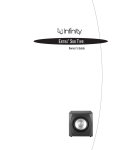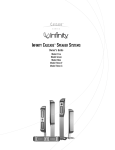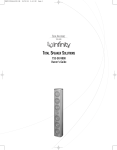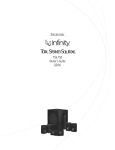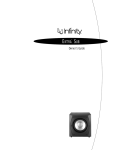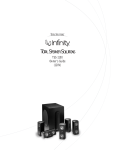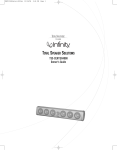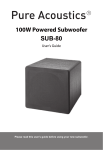Download Infinity SW-12 Subwoofer
Transcript
SW-12 (120V) OM 1/15/04 4:20 PM Page 3 Powered Subwoofer SW-12 Owner’s Guide (120V) SW-12 (120V) OM 1/15/04 4:20 PM Page 4 IMPORTANT SAFETY PRECAUTIONS Read First! CAUTION RISK OF ELECTRIC SHOCK DO NOT OPEN CAUTION: To reduce the risk of electric shock, do not remove cover (or back). No user-serviceable parts inside. Refer servicing to qualified service personnel. CAUTION: To prevent electric shock, do not use this (polarized) plug with an extension cord, receptacle or other outlet unless the blades can be fully inserted to prevent blade exposure. The lightning flash with arrowhead symbol, within an equilateral triangle, is intended to alert the user to the presence of uninsulated “dangerous voltage” within the product’s enclosure that may be of sufficient magnitude to constitute a risk of electric shock to persons. The exclamation point within an equilateral triangle is intended to alert the user to the presence of important operating and maintenance (servicing) instructions in the literature accompanying the appliance. 1. Read these instructions. 2. Keep these instructions. 3. Heed all warnings. 4. Follow all instructions. 5. Do not use this apparatus near water. 6. Clean only with a dry cloth. 7. Do not block any ventilation openings. Install in accordance with the manufacturer’s instructions. 8. Do not install near any heat sources such as radiators, heat registers, stoves or other apparatus (including amplifiers) that produce heat. 9. Do not defeat the safety purpose of the polarized or grounding-type plug. A polarized plug has two blades with one wider than the other. A grounding-type plug has two blades and a third grounding prong.The wide blade or the third prong are provided for your safety. If the provided plug does not fit into your outlet, consult an electrician for replacement of the obsolete outlet. used, use caution when moving the cart/apparatus combination to avoid injury from tip-over. 13. Unplug this apparatus during lightning storms or when unused for long periods of time. 14. Refer all servicing to qualified service personnel. Servicing is required when the apparatus has been damaged in any way, such as power-supply cord or plug is damaged, liquid has been spilled or objects have fallen into the apparatus, the apparatus has been exposed to rain or moisture, does not operate normally, or has been dropped. 15. Do not use attachments not recommended by the product manufacturer, as they may cause hazards. 16. This product should be operated only from the type of power source indicated on the marking label. If you are not sure of the type of power supply to your home, consult your product dealer or local power company. For products intended to operate from battery power, or other sources, refer to the operating instructions. 17. If an outside antenna or cable system is connected to the product, be sure the antenna or cable system is grounded so as to provide some protection against voltage surges and built-up static charges. Article 810 of the National Electrical Code, ANSI/NFPA 70, provides information with regard to proper grounding of the mast and supporting structure, grounding of the lead-in wire to an antenna discharge unit, size of grounding conductors, location of antenna discharge unit, connection to grounding electrodes, and requirements for the grounding electrode. See Figure A. 18. An outside antenna system should not be located in the vicinity of overhead power lines or other electric light or power circuits, or where it can fall into such power lines or circuits. When installing an outside antenna system, extreme care should be taken to keep from touching such power lines or circuits, as contact with them might be fatal. 19. Do not overload wall outlets, extension cords, or integral convenience receptacles, as this can result in a risk of fire or electric shock. 20. Never push objects of any kind into this product through openings, as they may touch dangerous voltage points or short-out parts that could result in a fire or electric shock. Never spill liquid of any kind on the product. 21. Do not attempt to service this product yourself, as opening or removing covers may expose you to dangerous voltage or other hazards. Refer all servicing to qualified service personnel. 22. When replacement parts are required, be sure the service technician has used replacement parts specified by the manufacturer or that have the same characteristics as the original part. Unauthorized substitutions may result in fire, electric shock or other hazards. 23. Upon completion of any service or repairs to this product, ask the service technician to perform safety checks to determine that the product is in proper operating condition. 24. The product should be mounted to a wall or ceiling only as recommended by the manufacturer. Figure A. Example of Antenna Grounding as per National Electrical Code ANSI/NFPA 70 10. Protect the power cord from being walked on or pinched, particularly at plugs, convenience receptacles and the point where they exit from the apparatus. Antenna Lead-In Wire 11. Only use attachments/accessories specified by the manufacturer. Grounding Conductors (NEC Section 810-21) 12. Use only with the cart, stand, tripod, bracket or table specified by the manufacturer or sold with the apparatus. When a cart is ii SW-12 Ground Clamp Antenna Discharge Unit (NEC Section 810-20) Electric Service Equipment Ground Clamps Power Service Grounding Electrode System (NEC Art. 250, Part H) SW-12 (120V) OM 1/15/04 4:20 PM Page 5 SW-12 OWNER’S GUIDE Table of Contents ii Important Safety Precautions 1 Unpacking the Subwoofer 1 Placement 2 Controls and Connections 3 Connections 4 Operation 5 Bass Optimization System™ 6 Maintenance and Service 7 Specifications SW-12 iii SW-12 (120V) OM 1/15/04 4:20 PM Page 4 Infinity SW-12 The Infinity SW-12 continues Infinity’s long-standing commitment to accurate sound reproduction. Our patented Ceramic Metal Matrix Diaphragm (CMMD™) drivers, high-powered amplifier and proprietary Bass Optimization System,™ along with a rigid, wellbraced enclosure, combine to deliver uncompromised bass performance in any stereo or multichannel home theater. Unpacking the Subwoofer If you suspect damage from transit, report it immediately to your dealer. Keep the shipping carton and packing materials for future use. PLACEMENT Since the installation of a subwoofer can be somewhat more complicated than installing full-range speakers, it is essential that you read this section very carefully prior to connecting the subwoofer to your system. Should you have questions relating to your installation, it is advisable to call either your dealer or Infinity’s Customer Service Department for advice. The performance of the subwoofer is directly related to its placement in the listening room and how you align the subwoofer with its satellite speakers. Setting the volume of the subwoofer in relationship to the left and right speakers is also of critical importance because it is essential that the subwoofer integrate smoothly with the entire system. Setting the subwoofer’s volume level too high will result in an overpowering, boomy bass. Setting the volume level too low will negate the benefits of the subwoofer. Here are several additional facts on installation that may prove useful. It is generally believed by most audio authorities that low frequencies (below 125Hz) are nondirectional and, therefore, placement of a subwoofer within any listening room is not critical. While in theory it is true that the larger wavelengths of extremely low frequencies are basically nondirectional, the fact is that, when installing a subwoofer within the limited confines of a room, reflections, standing waves and absorptions generated within the room will strongly influence the performance of any subwoofer system. As a result, the specific location of the subwoofer becomes important, and we strongly recommend that you experiment with placement before choosing a final location. Placement will depend upon your room and the amount and quality of bass required (for example, whether or not your room permits placement of the subwoofer near either satellite). 1 SW-12 SUB RIGHTCHANNEL SPEAKER PRIMARY LISTENING AREA Figure 1.This example shows the subwoofer positioned behind the right-channel satellite speaker to re-create the actual location of bass instruments in an orchestra and/or add impact to movie soundtracks. SW-12 (120V) OM 1/15/04 4:20 PM Page 5 CONTROLS AND CONNECTIONS Rear Panel £ ™ ¢ BASS OPTIMIZATION SYSTEM FREQUENCY LEVEL 180 Normal 0 LFE ∞ PHASE WIDTH ¡ ON ¶ § • 50 150 CROSSOVER GREEN: ON RED: STANDBY OFF POWER ª MIN MAX LEVEL ® ‚ LINE LEVEL IN R SW-12 L CAUTION RISK OF ELECTRIC SHOCK DO NOT OPEN R HIGH LEVEL IN ⁄ POWER WARNING: TO REDUCE THE RISK OF FIRE OR ELECTRIC SHOCK, DO NOT EXPOSE THIS APPLIANCE TO RAIN OR MOISTURE. ON AVERTISSEMENT: POUR PRÉVENIR LES RISQUES D'INCENDIE OU L DE CHOC ÉLECTRIQUE, ÉVITER D'EXPOSER CET APPAREIL A LA PLUIE OU A L'HUMIDITÉ. ‹ OFF P/N:352153-001 R HIGH LEVEL OUT ¤ L _ Infinity Systems Northridge, CA USA AC 120V ~ 60HZ 500W + Bass Optimization Controls (see page 5) ∞ Phase Switch ¡ Bass Optimization System Selector § Normal/LFE Selector ™ Center-Frequency Adjustment ¶ Power Indicator £ Bass Optimization System Level Adjustment • Crossover Adjustment ¢ Bass Optimization System Bandwidth Adjustment ª Subwoofer Level (Volume) Control ‚ Line-Level Inputs ⁄ High-Level (Speaker) Inputs ¤ High-Level (Speaker) Outputs ‹ Power Switch SW-12 2 SW-12 (120V) OM 1/15/04 4:20 PM Page 6 CONNECTIONS If you have a Dolby* Digital or DTS® receiver/processor with a low-frequency-effects (LFE) output: If your receiver/amplifier does not have subwoofer outputs for the left and right channels or an LFE output: SUBWOOFER OR LFE OUTPUT RECEIVER/AMPLIFIER Front Speaker Output BASS OPTIMIZATION SYSTEM FREQUENCY WIDTH LEVEL 180 Normal 0 LFE ON PHASE 50 150 CROSSOVER OFF POWER GREEN: ON RED: STANDBY BASS OPTIMIZATION SYSTEM MIN MAX LEVEL ® LINE LEVEL IN R SW-12 L FREQUENCY CAUTION RISK OF ELECTRIC SHOCK DO NOT OPEN R HIGH LEVEL IN DO NOT EXPOSE THIS APPLIANCE TO RAIN OR MOISTURE. POWER Normal 0 0 LFE WIDTH ON OFF POWER GREEN: ON RED: STANDBY ON AVERTISSEMENT: POUR PRÉVENIR LES RISQUES D'INCENDIE OU L LEVEL 180 PHASE WARNING: TO REDUCE THE RISK OF FIRE OR ELECTRIC SHOCK, DE CHOC ÉLECTRIQUE, ÉVITER D'EXPOSER CET APPAREIL A LA PLUIE OU A L'HUMIDITÉ. OFF P/N:352153-001 50 150 CROSSOVER MIN MAX LEVEL R ® HIGH LEVEL OUT LINE LEVEL IN Infinity Systems Northridge, CA USA L _ R SW-12 L CAUTION AC 120V ~ 60HZ 500W + RISK OF ELECTRIC SHOCK DO NOT OPEN R HIGH LEVEL IN POWER WARNING: TO REDUCE THE RISK OF FIRE OR ELECTRIC SHOCK, DO NOT EXPOSE THIS APPLIANCE TO RAIN OR MOISTURE. ON AVERTISSEMENT: POUR PRÉVENIR LES RISQUES D'INCENDIE OU L DE CHOC ÉLECTRIQUE, ÉVITER D'EXPOSER CET APPAREIL A LA PLUIE OU A L'HUMIDITÉ. OFF P/N:352153-001 • Set Normal/LFE Switch to LFE. R HIGH LEVEL OUT Infinity Systems Northridge, CA USA L _ AC 120V ~ 60HZ 500W + NOTE: In this case, you do not need to use a Y connector. Simply connect the LFE output on your receiver/processor to either the left or right input on the subwoofer. If your receiver/processor has subwoofer outputs for the left and right channels: • Set Normal/LFE Switch to Normal. RECEIVER/PROCESSOR RED = BLACK = + – BASS OPTIMIZATION SYSTEM 1. LOOSEN TERMINALS FREQUENCY LEVEL 180 Normal 0 LFE WIDTH ON PHASE 50 150 CROSSOVER OFF POWER 2. INSERT BARE END; TIGHTEN TERMINALS GREEN: ON RED: STANDBY MIN MAX LEVEL ® LINE LEVEL IN R STRIPE = SW-12 L CAUTION RISK OF ELECTRIC SHOCK DO NOT OPEN R HIGH LEVEL IN WARNING: TO REDUCE THE RISK OF FIRE OR ELECTRIC SHOCK, DO NOT EXPOSE THIS APPLIANCE TO RAIN OR MOISTURE. POWER ON AVERTISSEMENT: POUR PRÉVENIR LES RISQUES D'INCENDIE OU L DE CHOC ÉLECTRIQUE, ÉVITER D'EXPOSER CET APPAREIL A LA PLUIE OU A L'HUMIDITÉ. OFF P/N:351153-001 R HIGH LEVEL OUT L _ Infinity Systems Northridge, CA USA + AC 120V ~ 60HZ 500W • Set Normal/LFE Switch to Normal. NOTE: Some receivers have a single subwoofer output (do not confuse this with a single LFE output as described below). In that case, it is recommended that you use a Y connector (not included) to maximize performance. 3 SW-12 – NO STRIPE = + SW-12 (120V) OM 1/15/04 4:20 PM Page 7 OPERATION Power On Plug your subwoofer’s AC cord into a wall outlet. Do not use the outlets on the back of the receiver. Initially set the Subwoofer Level (Volume) Control ª to the “min” position. Turn on your sub by pressing the Power Switch ‹ on the rear panel. Crossover Adjustments Auto On/Standby The Crossover Adjustment Control • determines the highest frequency at which the subwoofer reproduces sounds. If your main speakers can comfortably reproduce some low-frequency sounds, set this control to a lower frequency setting, between 50Hz and 100Hz.This will concentrate the subwoofer’s efforts on the ultradeep bass sounds required by today’s films and music. If you are using smaller bookshelf speakers that do not extend to the lower bass frequencies, set the Crossover Adjustment Control to a higher setting, between 120Hz and 150Hz. With the Power Switch ‹ in the ON position, the Power Indicator LED ¶ will remain backlit in red or green to indicate the On/Standby mode of the subwoofer. RED = STANDBY (No signal detected, Amp Off) GREEN = ON (Signal detected, Amp On) The subwoofer will automatically enter the Standby mode after approximately 10 minutes when no signal is detected from your system.The subwoofer will then power ON instantly when a signal is detected. During periods of normal use, the Power Switch ‹ can be left on.You may turn off the Power Switch ‹ for extended periods of nonoperation, e.g., when you are away on vacation. Adjust Gain Turn on your entire audio system and start a CD or movie soundtrack at a moderate level.Turn up the Subwoofer Level (Volume) Control ª about half way. If no sound emanates from the subwoofer, check the AC-line cord and input cables. Are the connectors on the cables making proper contact? Is the AC plug connected to a “live” receptacle? Has the Power Switch ‹ been pressed to the “On” position? Once you have confirmed that the subwoofer is active, proceed by playing a CD, record or cassette. Use a selection that has ample bass information. NOTE: This control will have no effect if the Normal/LFE Selector Switch § is set to “LFE.” If you have a Dolby Digital or DTS processor/receiver, the Crossover Frequency is set by the processor/receiver. Consult your owner’s manual to learn how to view or change this setting. Phase Control The Phase Switch ∞ determines whether the subwoofer speaker’s piston-like action moves in and out with the main speakers, 0,˚ or opposite the main speakers, 180˚. Proper phase adjustment depends on several variables such as room size, subwoofer placement and listener position. Adjust the phase switch to maximize bass output at the listening position. Set the overall volume control of the preamplifier or stereo to a comfortable level. Adjust the Subwoofer Level (Volume) Control ª until you obtain a pleasing blend of bass. Bass response should not overpower the room but rather be adjusted so there is a harmonious blend across the entire musical range. Many users have a tendency to set the subwoofer volume too loud, adhering to the belief that a subwoofer is there to produce lots of bass.This is not entirely true. A subwoofer is there to enhance bass, extending the response of the entire system so the bass can be felt as well as heard. However, overall balance must be maintained or the music will not sound natural. An experienced listener will set the volume of the subwoofer so its impact on bass response is always there but never obtrusive. SW-12 4 SW-12 (120V) OM 1/15/04 4:20 PM Page 8 BASS OPTIMIZATION SYSTEM™ Infinity’s Bass Optimization System is a simple-to-use, yet sophisticated, low-frequency calibration system.The subwoofer contains a parametric equalizer that you can adjust following the directions below. By following these instructions, you can improve the sound of your system. The Bass Optimization System Goal It is a fact of audio that what we hear at low frequencies is determined as much or more by the listening room than by the loudspeaker itself. Placement of the loudspeakers and listeners and the acoustical characteristics of the room surfaces are all important determinants of bass quantity and quality. In most practical situations, there is little that can be done about this, except for patient trial-and-error repositioning of the loudspeakers and listeners. Usually, the practical constraints of a living space and the impracticality of massive acoustical treatment mean that equalization is the only practical solution. Professional sound engineers routinely employ sophisticated measurement systems and equalizers to optimize speakers to the installation.This was never practical for the home audiophile. This is why the Bass Optimization System was created. It enables you to identify the dominant low-frequency response characteristic of your room. Once you know the problem, the Bass Optimization System provides the tools needed to optimize the low-frequency characteristics of the speakers to the room they are in, exactly as the professional sound engineers do it. Preparations Before beginning the bass tests, please check the following: • Make sure all three Bass Optimization System controls on the subwoofer are turned fully clockwise. • Make sure the loudness contour (if any) on your receiver/ processor/preamp is turned off. • Set the receiver’s/processor’s tone controls (Bass and Treble) to their center or flat positions. • Bypass all surround and effects features of your receiver/ processor/preamp or set to Stereo Bypass. • If you are using a multichannel surround processor or receiver, make sure all bass-management features are properly set.The Audio channels should all be set to “Small” or “HighPass” and the subwoofer set to “On.” • Set the Bass Optimization System Selector ¡ to “On.” For best results, it is recommended that all major furnishings are in place and that all doors and windows in the listening area are in their normal positions.That is, if you normally listen to music with all doors closed, then this is how they should be during this procedure. 5 SW-12 To solve a problem, it helps to first identify whether you have one and, if so, what it is. First, play a variety of music and films with energetic bass sounds, like bass guitar, kick drum, keyboards, etc. A kick drum should produce a tight “thump” , not a flabby“boom.” Bass melody or harmony lines should have notes that are about equally loud. If some notes disappear, or stand out because they are consistently too loud, there is a problem. Disappearing notes have to be handled by moving the listening position, or the loudspeakers, to slightly different locations. Often, but sadly not always, this will be enough. Excesses in bass tend to be most annoying, and energetic resonances that cause “boomy” or “lumpy” bass can be truly aggravating over a period of time. Infinity’s Bass Optimization System can fix this. So, the first step is to exercise your music collection, and listen for low-frequency problems that crop up in several different recordings. Something that only happens in one recording is likely to be a problem in the recording – it happens! If you identify something that is consistently wrong, select a record that shows it very clearly, and put your CD/DVD player into a repeat mode (A-B repeat is especially helpful, because you can isolate a short musical passage). Set the Bass Optimization System Bandwidth Adjustment Control ¢ to a middle position (10 clicks from a fully clockwise position) and set the Level Adjustment £ for a –6dB (8 clicks from a fully clockwise position).Then, while the music is playing, sit in your favorite chair and have somebody else slowly adjust the Center-Frequency control ™ from fully clockwise to fully counterclockwise. At a certain frequency, you should hear the problem lessen and the overall bass performance improve. When you are satisfied that you have found the best frequency, have your assistant vary the Level £ slowly up and down until you have maximized the improvement. If you have really keen ears, you can also have the Bandwidth Adjustment control ¢ adjusted for maximum benefit. While the Bass Optimization System allows the listener to finetune the bass response to sound best in a particular room, some listeners don’t have the skill or desire to adjust their system by ear. In order to facilitate quicker and more accurate results, Infinity has developed an optional test and measurement kit that allows the user to perform a series of measurements and aids him/her in properly setting the Bass Optimization System controls. With the addition of this kit, the Bass Optimization System becomes truly room-adaptive.The kit consists of the following: a test CD, a sound-level meter that is specifically calibrated for low frequencies, and something we call a “Q-Finder,” a device to help find the width of the measured curve and, finally, a measurement template. It works as follows.The listener SW-12 (120V) OM 1/15/04 4:20 PM Page 9 plays the tones from the test CD and records the relative output level of each test tone, using the sound-level meter, on the provided measurement template. After all the tones are complete, the template contains a response curve for the frequencies below 100Hz.The user simply notes the frequency of the largest bass peak, calculates the correct amount of attenuation, and uses the “Q-Finder”to determine the width of the curve.These three values are dialed into the Bass Optimization System controls located on the speaker.The entire process takes less than twenty minutes. If your dealer does not stock the Bass Optimization System test and measurement kit, you may purchase it directly from Infinity. U.S. residents can visit our Web site at www.infinitysystems.com or call 1.516.674.4INF. MAINTENANCE AND SERVICE The enclosure and grille may be cleaned using a soft cloth to remove fingerprints or to wipe off dust. All wiring connections should be inspected and cleaned or remade periodically.The frequency of maintenance depends on the metals involved in the connections, atmospheric conditions, and other factors, but once per year is the minimum. If a problem occurs, make sure that all connections are properly made and clean. In the event that your Infinity SW-12 subwoofer ever needs service, contact your local Infinity dealer or Infinity directly at 1.516.674.4INF (USA only) or www.infinitysystems.com for a service center near you. SW-12 6 SW-12 (120V) OM 1/15/04 4:20 PM Page 10 SPECIFICATIONS SW-12 Frequency Response 28Hz – 150Hz (±3dB) Maximum Amplifier Output 500 watts RMS (20Hz – 150Hz with no more than 0.1% THD) Crossover Frequencies 50Hz – 150Hz, 24dB/octave, continuously variable Driver 12" (305mm) CMMD™ Dimensions (H x W x D) 16-3/4" x 14-7/8" x 19-7/8" (425mm x 378mm x 505mm) Weight 45 lb (20.5kg) Optional Accessory Bass Optimization Test & Measurement Kit Part Number: 335852-002 Infinity continually strives to update and improve existing products, as well as create new ones.The specifications and construction details in this and related Infinity publications are therefore subject to change without notice. 7 SW-12 SW-12 (120V) OM 1/15/04 NOTES 4:20 PM Page 11 SW-12 (120V) OM 1/15/04 4:20 PM Page 2 Infinity Systems, 250 Crossways Park Drive, Woodbury, NY 11797 USA 516.674.4INF (4463) www.infinitysystems.com * Trademark of Dolby Laboratories. DTS is a registered trademark of Digital Theater Systems, Inc. Infinity is a registered trademark, and CMMD and Bass Optimization System (B.O.S.) are trademarks, of Harman International Industries, Incorporated. Ceramic Metal Matrix Diaphragm patent nos. 6,327,372 and 6,404,897 Part No. 352614-001 © 2003 Harman International Industries, Incorporated













